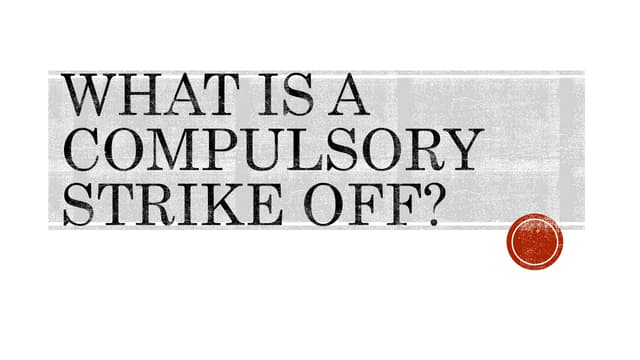First Gazette Notice for Compulsory Strike Off Described
First Gazette Notice for Compulsory Strike Off Described
Blog Article
Comprehending the Refine and Effects of Compulsory Strike Off Under Firm Legislation
In the world of firm law, the process and implications of compulsory strike off hold significant weight for organizations and their directors. Understanding the details of why firms deal with such an outcome, the precise steps entailed in the strike off procedure, and the significant implications for all celebrations included is important in navigating the complex landscape of corporate administration. As we explore the factors behind obligatory strike offs, the taking place procedures, and the subsequent effects, a more clear picture arises of the extensive influence it can have on entities and individuals alike.
Factors for Compulsory Strike Off
Mandatory strike off under company regulation is launched by the regulative authorities for details reasons associated with non-compliance or functional abnormalities. The primary factor for a business to encounter obligatory strike off is the failure to submit yearly returns or monetary declarations for an extensive duration. This non-compliance indicates a lack of transparency and adherence to governing needs, raising worries about the company's monetary health and liability.

Process of Strike Off
Offered the governing authority's initiation of mandatory strike off for various reasons, comprehending the process of strike off is important for firms dealing with potential dissolution under firm legislation. The procedure usually begins with the regulatory authority sending notices to the company's authorized workplace address, informing them of the approaching strike off. It is necessary for the firm to address any type of exceptional problems, such as submitting past due documents or resolving superior charges, within the specified timeframe to prevent dissolution.

Ramifications for Firms
What are the implications for business facing obligatory strike off under firm law? Business facing mandatory strike off might experience numerous significant ramifications. Firstly, the company ceases to legitimately exist, causing the loss of its business status and the coming with advantages and protections. This can result in the failure to become part of contracts, conduct company, or pursue legal actions in the firm's name.
Moreover, the company's possessions at the time of strike off come to be home of the state, which can lead to monetary losses for lenders and shareholders. Shareholders may lose their investments, while financial institutions may have a hard time to recoup any arrearages owed to them by the struck-off company.
Furthermore, directors of the company may deal with disqualification from holding similar placements in other companies for a given period (first gazette notice for compulsory strike off). This can taint their expert reputation and limit their future service chances
Effects for Supervisors
Dealing with compulsory strike off under company legislation can have serious ramifications for supervisors, influencing their future roles in various other firms and my link possibly tarnishing their specialist standing. Supervisors of a business dealing with mandatory strike off might discover it challenging to secure directorial settings in other firms in the future. Overall, the consequences of obligatory strike off for supervisors extend beyond the certain business in inquiry, affecting their profession prospects and specialist reputation in the long term.
Preventing Compulsory Strike Off

Conclusion
To conclude, recognizing the process and implications of required strike off under company regulation is crucial for directors and business to ensure compliance with policies. By being aware of the factors for strike off, the procedure entailed, and the repercussions for all parties entailed, companies can take actions to avoid undergoing required strike off. It is very important for supervisors to be proactive in preserving appropriate documents and meeting legal obligations to protect against the threat of strike off.
Provided the governing authority's initiation of obligatory strike off for various factors, understanding the process of strike off is critical for companies facing prospective dissolution under company law.What are the ramifications for business dealing with required strike off under firm regulation?Encountering mandatory content strike off under company regulation can have extreme ramifications for supervisors, affecting their future functions in other firms and possibly tainting their expert standing. Supervisors of a business facing mandatory strike off may find it testing to protect directorial positions in other companies in the future.In verdict, recognizing the procedure and effects of compulsory strike off under business law is important for firms and directors to ensure compliance with laws.
Report this page